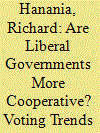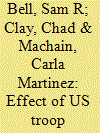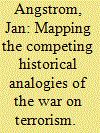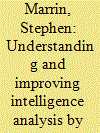| Srl | Item |
| 1 |
ID:
167369


|
|
|
|
|
| Summary/Abstract |
Among both elites and the mass public, conservatives and liberal differ in their foreign policy preferences. Relatively little effort, however, has been put toward showing that, beyond the use of force, these differences affect the day-to-day outputs and processes of foreign policy. This article uses United Nations voting data from 1946 to 2008 of the five major Anglophone democracies of the United States, the United Kingdom, Canada, Australia, and New Zealand to show that each of these countries votes more in line with the rest of the world when liberals are in power. This can be explained by ideological differences between conservatives and liberals and the ways in which the socializing power of international institutions interact with preexisting ideologies. The results hope to encourage more research into the ways in which ideological differences among the masses and elites translate into differences in foreign policy goals and practices across governments.
|
|
|
|
|
|
|
|
|
|
|
|
|
|
|
|
| 2 |
ID:
156533


|
|
|
|
|
| Summary/Abstract |
US noninvasion troops deployed abroad often try to promote greater respect for human rights in the host country. The host country, having an incentive to retain the troop presence, may choose to comply with these requests. We argue that this effect will not be at play in states with high security salience for the United States (US) (for which the US may not be able to credibly threaten to remove the troops). In these cases, US deployments will provide the leader with security from both internal and external threats that is independent of the local population’s support for the leader. Host state leaders thus become less reliant on (and potentially less responsive to) their local populations, which in turn may lead to increased human rights violations. In this article, we use data on both US troop deployments abroad and on human rights violations to test these arguments from 1982 to 2005.
|
|
|
|
|
|
|
|
|
|
|
|
|
|
|
|
| 3 |
ID:
106432


|
|
|
|
|
| Publication |
2011.
|
| Summary/Abstract |
This article maps the historical analogies of the war on terrorism used by the Bush administration. It identifies four historical analogies of the war on terrorism present in the US political and academic discourse since the attacks on 11 September 2001. These are the war on terrorism as: (a) the Second World War; (b) the Crusades; (c) the Vietnam War; and (d) the Cold War. These analogies have been a constant presence in the US discourse, although the analogy with the Crusades has been more prominent in the academic discourse than in the political. There is, moreover, no conclusive pattern of when and how these analogies have been used, suggesting that we cannot use them to evaluate how well the war on terrorism is progressing. This also indicates that the Bush administration, with one exception, was not successful in framing the policy agenda in a certain direction regarding the war on terrorism. Understanding the war on terrorism as a new Cold War, for example, still implies different policy measures such as roll-back and containment.
|
|
|
|
|
|
|
|
|
|
|
|
|
|
|
|
| 4 |
ID:
153074


|
|
|
|
|
| Summary/Abstract |
Intelligence organizations acquire, evaluate, assess, and disseminate information to support national security and foreign policy decision-making. It is part of a government’s efforts to get as close to complete information as possible about both the operating environment as well as other actors. The methodologies employed by intelligence analysts are similar to yet different from those used in many other academic disciplines and professional fields. This discussion about methodology – a form of comparative applied epistemology – can be used to better understand intelligence analysis as a function of government and improve the performance of intelligence analysts.
|
|
|
|
|
|
|
|
|
|
|
|
|
|
|
|